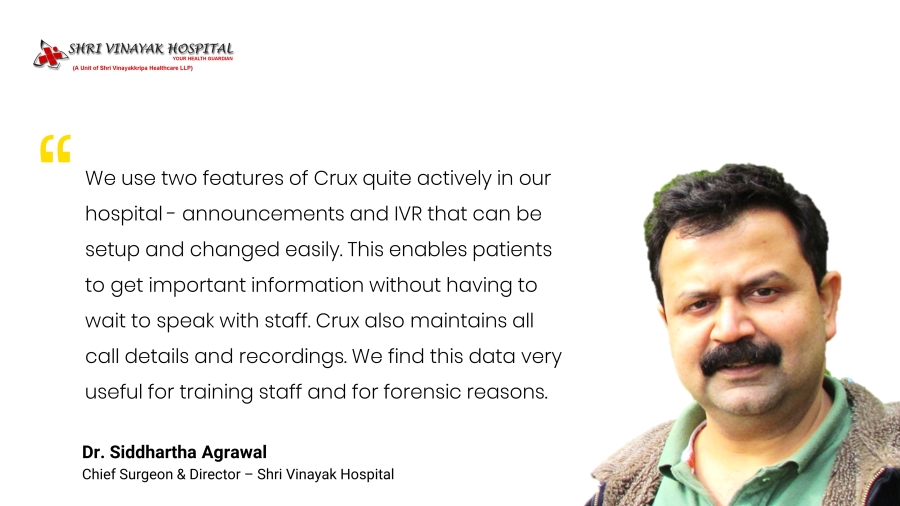Crux has been built to fill the gap between convenient but pricey cloud telephony and costly and infrastructure-hungry on-premise counterparts. We have combined the flexibility and convenience of cloud telephony, with robustness and reliability of an on-premise solution to bring to you the features and benefits that matter the most to your business.

With this feature, when a call is placed on hold, the person on hold hears music instead of silence. In Crux, you can upload your own music or setup an offer message as Music on Hold (MoH).

This feature allows you to transfer incoming calls on your extension, in blind or attended mode, to another extension or phone number. Blind transfers are where the call is transferred without you needing to stay on the line. Attended transfers are where the call is transferred after you have an introductory conversation with the person who is receiving the transfer.

This feature allows you to direct calls that are meant for your extension to be forwarded to another extension or phone number, such as your cell phone or home phone number.

This feature allows an incoming call to be parked and then picked up by any other extension. This is an alternative to transferring a call directly to a particular extension. Some organizations prefer to park the incoming call and let the desired person to pick up the call from wherever they are in the building using a phone closest to them.

This feature is a presence indicator that allows you to see who in your organization is available or unavailable for a phone call at the time.

This feature enables simultaneous ringing to automatically redirect incoming calls to multiple extensions at the same time. This ensures quicker response as the customer will always find an agent to talk to, thereby improving the customer experience.

This feature allows you to set up an ad-hoc conference call with three parties (the original caller, yourself, and additional parties). In Crux, number of additional parties is configurable.

This feature is also called a Department Code that allows a group of extensions to be grouped together such that they will ring all together or in a specified order when a group number or code is dialled – anyone at one of these extensions can answer the call. This approach maximises the chances of customer calls being attended by a relevant person, thereby reducing number of missed calls.

This feature allows you to add characters to the Caller Identification (CID) of the caller. This can be useful if you have multiple DIDs pointing to the same extension or ring group and you need to identify which number was dialled by the caller before picking up the call.

Also called as Directed Call Pickup, this feature allows you to answer a call that may be ringing at some other extension, from your own extension.

Also known as Voice Logging, this feature records the call conversation (both caller and callee) and saves the recording as a WAV file on Crux that can be access controlled by the Administrator of the Crux system. In Crux, you can choose extensions, phone lines, or internal or external nature of calls that are to be recorded. Crux also allows on-demand recording – that allows you to start recording a call dynamically during the call.

A call detail record (CDR) provides information about calls made over a phone system like Crux. A CDR report can offer businesses exact answers about where, when, and how calls are made for reporting and billing purposes.

Voicemail is an electronically stored voice message that is left by a caller to be retrieved later by the intended recipient. The recipient can retrieve the stored message through a phone, or an app on smart phone or desktop or laptop, or over email and other communication devices. Crux allows email ids to be setup for each extension to receive an alert when a voicemail is left for that user.

This is same as IVR, but instead of this being organization wide, it is a personal IVR for individual extension. In Crux, each extension can also have its own personalized IVR.

This feature enables designated users (usually the company operator or receptionist) to override the normal routing of calls based on the time of day using time groups and time schedules. For example, the system may be configured to direct calls during office hours directly to the receptionist and to route calls to voice menu after hours or on holidays. Using the day/night control, the receptionist can also override the time setting when needed.

Interactive Voice Response (IVR) or Auto Attendant is a self-assisted voice menu system that allows callers to be transferred to an extension without going through a telephone operator or receptionist.

This feature, also known as Automatic Call Distribution (ACD), queues up callers and efficiently holds and distributes incoming calls among a group of call representatives or agents. This is particularly of use to call centres that have a large number of callers and a small set of agents answering those calls.

This feature allows multiple callers to join a single group conference call by dialing a meeting group id and an authentication PIN. Crux provides numerous conference room and participant management capabilities including muting/unmuting all participants etc. Crux can setup as many conference rooms as are needed and as many people can join a conference room session as you have internal and external lines available.

A video call is a phone call using VoIP, that utilizes video to transmit a live picture of the person making the call. Video calls are made using a computer’s webcam or other electronic devices with a video-capable camera, like a smartphone, tablet, or video-capable IP phone instrument.

This feature allows a fax to be received and transformed into a PDF attachment and sent directly to your email inbox for your review. You can forward these attachments, save them to your computer, or print them at any time.

A paging system allows for one-way communication to a large audience. Regardless of the broadcast source, a one-way paging system lets the speaker provide clear, amplified notifications.

A SIP door phone with camera, also called an IP Video Door Phone, is a security and access control device that is specially installed outside the door, has a high-definition camera and a push-to-talk feature that provides users with two-way voice communication with a camera to observe visitors and allow entry.

Dial Plan is a programmatic way to set up rules for digits that are allowed or disallowed from being dialled as well as for call routing. This can also be used to limit users from dialling certain prohibited numbers or country codes.

This feature enables you to access office phone line from outside the office, and be able to make an outgoing call using the office phone line. The called party receives the call as though it is coming from your office. This feature is useful when you don’t have extension mobility outside office.

This capability refers to extension mobility, wherein an extension can be setup on a mobile device (like a laptop or smartphone or tab) using a Softphone Application, thus making it possible to make and receive office phone calls even when you are not in office.

A SIP trunk is the digital version of an Analog phone line. Using SIP trunks, a SIP provider can connect one, two, or thousands of channels (or calls) to a PBX like Crux, allowing you to make multiple local, long distance, and international calls over the Internet.

Instant messaging (IM) technology is a type of online chat that offers real-time text transmission over the Internet. A few models of Crux meant for Call Centers support IM capability for internal agents and supervisor.

This capability allows you to create groups, add notes, add new companies with appropriate employees and their phone numbers. All the contacts are shared between devices, so once you save a contact you’ll see the details on your handset, mobile app, web interface, etc.

This refers to a comprehensive administration portal running locally on Crux that enables creation of multiple administrators, with varying access controls, to administer fine details of the Crux calling system, extensions, user management, feature management, reporting and logging.

This feature enables making periodic copies of data to Crux or a separate, secondary device and then using those copies to recover the data in the event that the original data is lost.

This refers to the High Availability capability that allows two Crux units to be setup as replicas of each other in an Active-Passive mode for a fallback scenario. This is useful for businesses that rely heavily on phone system availability and uptime.

This refers to a security feature that allows only authentic users to connect to Crux. It requires all incoming extension registration requests to be authenticated for SIP credentials and those failing be blocked temporarily for a period of time or permanently. This feature is a must for those phone systems that are exposed to internet.
Enterprise-grade features at SME price
A must for Call Centres
In-Depth Performance Reporting
Know how your team performs. Measure the time taken to resolve customer queries and distribute resources based on call volume analysis.
- Real-time supervisor dashboard
- Agent performance and call analytics reports
- SLA tracking
A complete Office Phone system
Cross-border Intercom Connectivity
Connect your employees and offices across borders, allowing them to talk to each other free of cost
- Add 250 employees with unique extensions in a single setup
- Allow free internal calling between your employees with call data secure in your on-premise database
- Create teams and track all official conversations between them
Flexible APIs and web-hooks
Open source APIs and web-hooks allow you to integrate Crux into your existing CRM systems
- REST APIs for easy integration
- Web-hooks for triggering workflows
- Click2Call and Callback
Multi-Level Auto Attendants
Multiple IVRs or Auto Attendants to direct customers to the right team even during off-office hours
- Multi-level IVR prompts
- Priority-based Auto Call Distribution
- Day and Night mode
Call Tracking and Recording
Listen to your customers and how your agents respond to them to improve customer experience
- Listen-in to calls to maintain quality
- Call records to help with forensics
- Secure your call data on-premise
One of the most secure VoIP product
Enterprise-grade Security
Pre-configured enterprise-grade IP security to make sure that your data is protected from attempts of unauthorized access
- Local on-premise database
- Firewall protected system
- Role based access control
Investment protection for long
Works with Existing Infrastructure
Use what you already have, connect Crux to your existing telephony and IT infrastructure to maximize returns
- Use existing phone lines and network
- No cables to be laid and No phone instruments to be purchased
- Reduce your carbon-footprint on telecom equipment by 96%








